人教版高中英语选修七第一学期高二期中考试英语试卷
- 格式:doc
- 大小:141.00 KB
- 文档页数:14
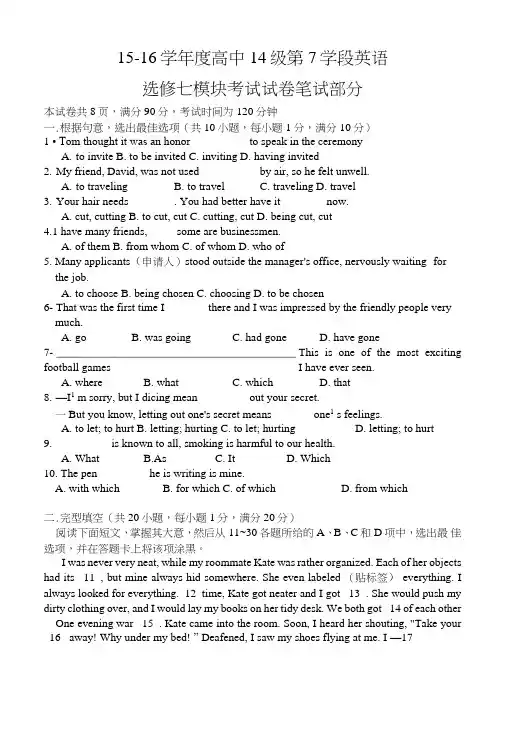
15-16学年度高中14级第7学段英语选修七模块考试试卷笔试部分本试卷共8页,满分90分,考试时间为120分钟一.根据句意,选出最佳选项(共10小题,每小题1分,满分10分)1 • Tom thought it was an honor __________ t o speak in the ceremonyA.to inviteB. to be invitedC. invitingD. having invited2.My friend, David, was not used _________ by air, so he felt unwell.A.to travelingB. to travelC. travelingD. travel3.Your hair needs _______ . You had better have it _______ now.A. cut, cuttingB. to cut, cutC. cutting, cutD. being cut, cut4.1 have many friends, ___ some are businessmen.A. of themB. from whomC. of whomD. who of5. Many applicants(申请人)stood outside the manager's office, nervously waiting for the job.A. to chooseB. being chosenC. choosingD. to be chosen6-That was the first time I ______ there and I was impressed by the friendly people very much.A. goB. was goingC. had goneD. have gone7- ______________________________________ This is one of the most exciting football games _______________________________ I have ever seen.A. whereB. whatC. whichD. that8.—I1 m sorry, but I dicing mean _________ o ut your secret.一But you know, letting out one's secret means _______ one1 s feelings.A. to let; to hurtB. letting; hurtingC. to let; hurtingD. letting; to hurt9._________ is known to all, smoking is harmful to our health.A. WhatB.AsC. ItD. Which10.The pen ________ he is writing is mine.A. with whichB. for whichC. of whichD. from which二.完型填空(共20小题,每小题1分,满分20分)阅读下面短文,掌握其大意,然后从11~30各题所给的A、B、C和D项中,选出最佳选项,并在答题卡上将该项涂黑。
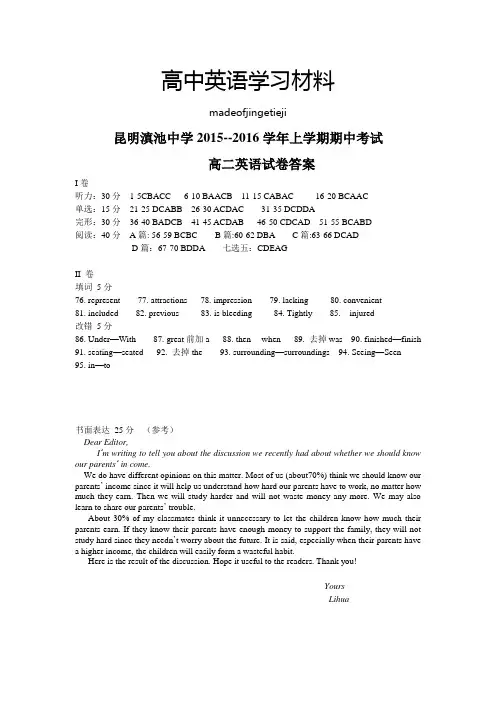
高中英语学习材料madeofjingetieji昆明滇池中学2015--2016学年上学期期中考试高二英语试卷答案I卷听力:30分1-5CBACC 6-10 BAACB 11-15 CABAC 16-20 BCAAC单选:15分21-25 DCABB 26-30 ACDAC 31-35 DCDDA完形:30分36-40 BADCB 41-45 ACDAB 46-50 CDCAD 51-55 BCABD阅读:40分A篇: 56-59 BCBC B篇:60-62 DBA C篇:63-66 DCADD篇:67-70 BDDA 七选五:CDEAGII 卷填词5分76. represent 77. attractions 78. impression 79. lacking 80. convenient81. included 82. previous 83. is bleeding 84. Tightly 85. injured改错5分86. Under—With 87. great前加a 88. then--- when 89. 去掉was 90. finished—finish 91. seating—seated 92. 去掉the 93. surrounding—surroundings 94. Seeing—Seen 95. in—to书面表达25分(参考)Dear Editor,I’m writing to tell you about the discussion we recently had about whether we should know our parents’ in come.We do have different opinions on this matter. Most of us (about70%) think we should know our parents’ income since it will help us understand how hard our parents have to work, no matter how much they earn. Then we will study harder and will not waste money any more. We may also learn to share our parents’ trouble.About 30% of my classmates think it unnecessary to let the children know how much their parents earn. If they know their parents have enough money to support the family, they will not study hard since they needn’t worry about the future. It is said, especially when their parents have a higher income, the children will easily form a wasteful habit.Here is the result of the discussion. Hope it useful to the readers. Thank you!YoursLihua。
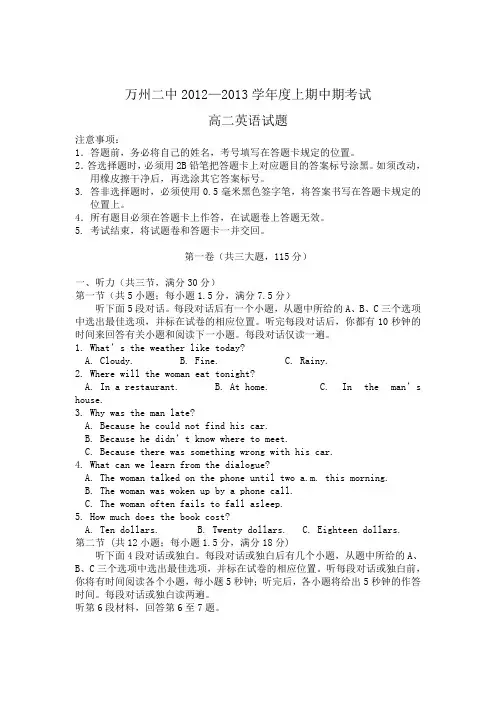
万州二中2012—2013学年度上期中期考试高二英语试题注意事项:1.答题前,务必将自己的姓名,考号填写在答题卡规定的位置。
2.答选择题时,必须用2B铅笔把答题卡上对应题目的答案标号涂黑。
如须改动,用橡皮擦干净后,再选涂其它答案标号。
3. 答非选择题时,必须使用0.5毫米黑色签字笔,将答案书写在答题卡规定的位置上。
4.所有题目必须在答题卡上作答,在试题卷上答题无效。
5. 考试结束,将试题卷和答题卡一并交回。
第一卷(共三大题,115分)一、听力(共三节,满分30分)第一节(共5小题;每小题1.5分,满分7.5分)听下面5段对话。
每段对话后有一个小题,从题中所给的A、B、C三个选项中选出最佳选项,并标在试卷的相应位置。
听完每段对话后,你都有10秒钟的时间来回答有关小题和阅读下一小题。
每段对话仅读一遍。
1. What’s the weather like today?A. Cloudy.B. Fine.C. Rainy.2. Where will the woman eat tonight?A. In a restaurant.B. At home.C. In the man’s house.3. Why was the man late?A. Because he could not find his car.B. Because he didn’t know where to meet.C. Because there was something wrong with his car.4. What can we learn from the dialogue?A. The woman talked on the phone until two a.m. this morning.B. The woman was woken up by a phone call.C. The woman often fails to fall asleep.5. How much does the book cost?A. Ten dollars.B. Twenty dollars.C. Eighteen dollars.第二节 (共12小题;每小题1.5分,满分18分)听下面4段对话或独白。
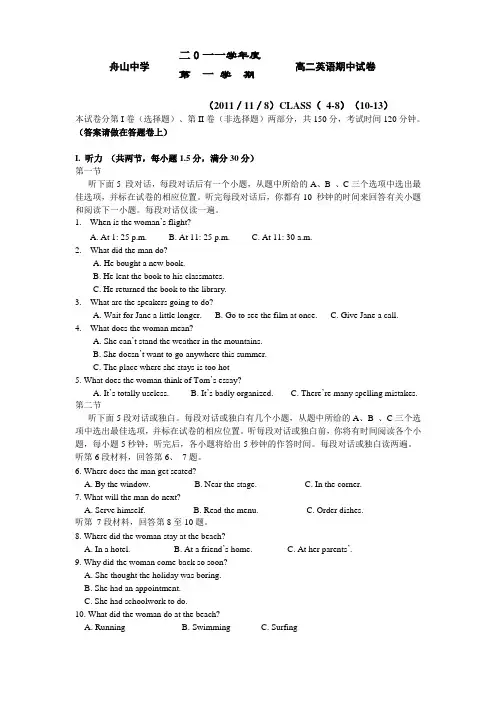
舟山中学 高二英语期中试卷(2011/11/8)CLASS ( 4-8)(10-13)本试卷分第I 卷(选择题)、第II 卷(非选择题)两部分,共150分,考试时间120分钟。
(答案请做在答题卷上)I. 听力 (共两节,每小题1.5分,满分30分)第一节听下面5 段对话,每段对话后有一个小题,从题中所给的A 、B 、C 三个选项中选出最佳选项,并标在试卷的相应位置。
听完每段对话后,你都有10 秒钟的时间来回答有关小题和阅读下一小题。
每段对话仅读一遍。
1. When is the woman ’s flight?A. At 1: 25 p.m.B. At 11: 25 p.m.C. At 11: 30 a.m.2. What did the man do?A. He bought a new book.B. He lent the book to his classmates.C. He returned the book to the library.3. What are the speakers going to do?A. Wait for Jane a little longer.B. Go to see the film at once.C. Give Jane a call.4. What does the woman mean?A. She can ’t stand the weather in the mountains.B. She doesn ’t want to go anywhere this summer.C. The place where she stays is too hot5. What does the woman think of Tom ’s essay?A. It ’s totally useless.B. It ’s badly organized.C. There ’re many spelling mistakes.第二节听下面5段对话或独白。
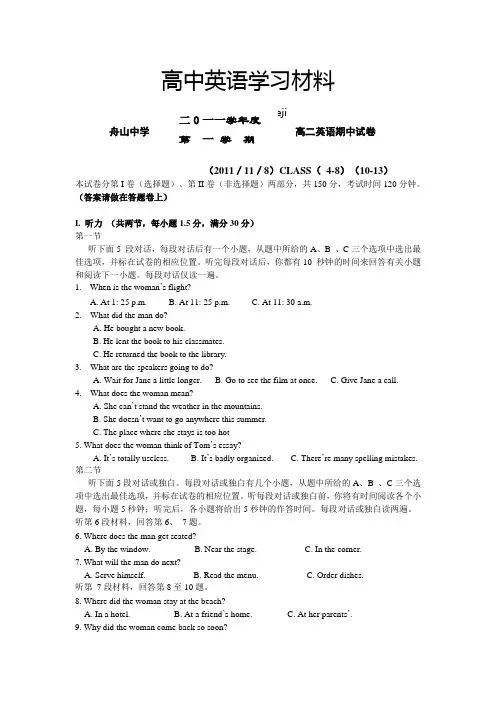
高中英语学习材料 madeofjingetieji舟山中学 高二英语期中试卷(2011/11/8)CLASS ( 4-8)(10-13)本试卷分第I 卷(选择题)、第II 卷(非选择题)两部分,共150分,考试时间120分钟。
(答案请做在答题卷上)I. 听力 (共两节,每小题1.5分,满分30分)第一节听下面5 段对话,每段对话后有一个小题,从题中所给的A 、B 、C 三个选项中选出最佳选项,并标在试卷的相应位置。
听完每段对话后,你都有10 秒钟的时间来回答有关小题和阅读下一小题。
每段对话仅读一遍。
1. When is the woman ’s flight?A. At 1: 25 p.m.B. At 11: 25 p.m.C. At 11: 30 a.m.2. What did the man do?A. He bought a new book.B. He lent the book to his classmates.C. He returned the book to the library.3. What are the speakers going to do?A. Wait for Jane a little longer.B. Go to see the film at once.C. Give Jane a call.4. What does the woman mean?A. She can ’t stand the weather in the mountains.B. She doesn ’t want to go anywhere this summer.C. The place where she stays is too hot5. What does the woman think of Tom ’s essay?A. It ’s totally useless.B. It ’s badly organized.C. There ’re many spelling mistakes.第二节听下面5段对话或独白。
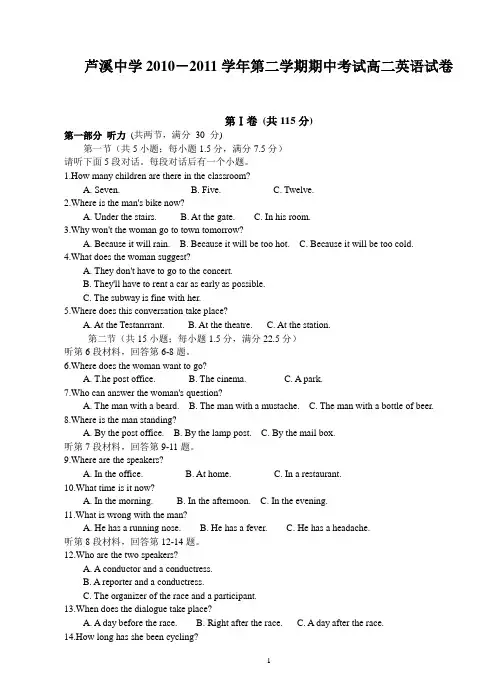
芦溪中学2010-2011学年第二学期期中考试高二英语试卷第Ⅰ卷(共115分)第一部分听力(共两节,满分30 分)第一节(共5小题;每小题1.5分,满分7.5分)请听下面5段对话。
每段对话后有一个小题。
1.How many children are there in the classroom?A. Seven.B. Five.C. Twelve.2.Where is the man's bike now?A. Under the stairs.B. At the gate.C. In his room.3.Why won't the woman go to town tomorrow?A. Because it will rain.B. Because it will be too hot.C. Because it will be too cold.4.What does the woman suggest?A. They don't have to go to the concert.B. They'll have to rent a car as early as possible.C. The subway is fine with her.5.Where does this conversation take place?A. At the Testanrrant.B. At the theatre.C. At the station.第二节(共15小题;每小题1.5分,满分22.5分)听第6段材料,回答第6-8题。
6.Where does the woman want to go?A. T.he post office.B. The cinema.C. A park.7.Who can answer the woman's question?A. The man with a beard.B. The man with a mustache.C. The man with a bottle of beer.8.Where is the man standing?A. By the post office.B. By the lamp post.C. By the mail box.听第7段材料,回答第9-11题。
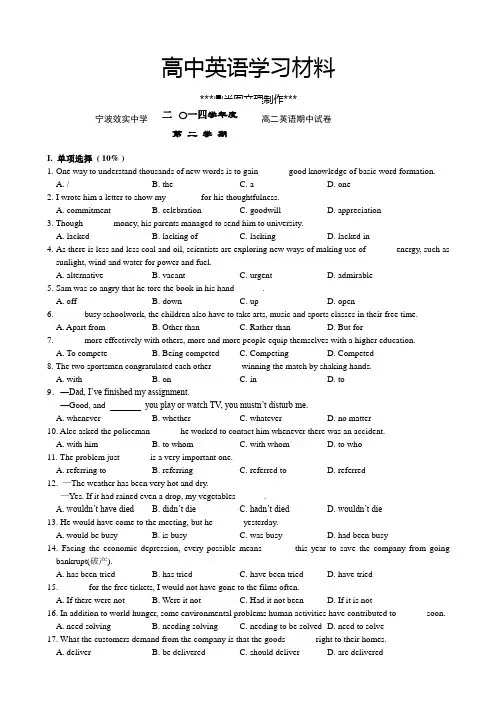
高中英语学习材料 ***鼎尚图文理制作***宁波效实中学 高二英语期中试卷I. 单项选择 ( 10% )1. One way to understand thousands of new words is to gain ______ good knowledge of basic word formation.A. /B. theC. aD. one2. I wrote him a letter to show my _______ for his thoughtfulness.A. commitmentB. celebrationC. goodwillD. appreciation3. Though ______ money, his parents managed to send him to university.A. lackedB. lacking ofC. lackingD. lacked in4. As there is less and less coal and oil, scientists are exploring new ways of making use of ______ energy, such as sunlight, wind and water for power and fuel.A. alternativeB. vacantC. urgentD. admirable5. Sam was so angry that he tore the book in his hand ______.A. offB. downC. upD. open6. ______ busy schoolwork, the children also have to take arts, music and sports classes in their free time.A. Apart fromB. Other thanC. Rather thanD. But for7. ______ more effectively with others, more and more people equip themselves with a higher education.A. To competeB. Being competedC. CompetingD. Competed8. The two sportsmen congratulated each other ______ winning the match by shaking hands.A. withB. onC. inD. to9.—Dad, I’ve finished my assignment.—Good, and you play or watch TV, you mustn’t disturb me.A. wheneverB. whetherC. whateverD. no matter10. Alec asked the policeman ______ he worked to contact him whenever there was an accident.A. with himB. to whomC. with whomD. to who11. The problem just ______ is a very important one.A. referring toB. referringC. referred toD. referred12. —The weather has been very hot and dry.—Yes. If it had rained even a drop, my vegetables ______.A. wouldn’t have diedB. didn’t dieC. hadn’t diedD. wouldn’t die13. He would have come to the meeting, but he ______ yesterday.A. would be busyB. is busyC. was busyD. had been busy14. Facing the economic depression, every possible means ______ this year to save the company from going bankrupt(破产).A. has been triedB. has triedC. have been triedD. have tried15. ______ for the free tickets, I would not have gone to the films often.A. If there were notB. Were it notC. Had it not beenD. If it is not16. In addition to world hunger, some environmental problems human activities have contributed to ______ soon.A. need solvingB. needing solvingC. needing to be solvedD. need to solve17. What the customers demand from the company is that the goods ______ right to their homes.A. deliverB. be deliveredC. should deliverD. are delivered二 一四学年度 第 二 学 期18. —What made you so upset?—______ my house ______ saying goodbye.A. Jim left; withoutB. Jim’s leaving; instead ofC. That Jim left; withoutD. Jim leaving; instead of19. Was it in the village ________ he was born ________ the talented journalist met the retired professor?A. that, whereB. where, whichC. which, whereD. where, that20. —I didn't know this was a one-way street, officer.—_______.A. That's all rightB. I don't believe youC. How dare you say thatD. Sorry, but that's no excuseII. 完形填空( 20% )I was hard at work on a museum project when the client suddenly canceled it. My 21 told me I was no longer needed. I had just $1,000 in savings.After 22 architecture jobs on the Internet, I got one interview, 23 nothing came of it. 24 , I took a job as a waiter. I knew I’d have to find a place to live that 25 less than the $500 a month I was paying.I went to see a bedroom for 26 . It was listed for $500, but the landlord said I could 27 it for $350 if he used the closet for storage. I told him later, “I don’t want the bedroom, but I’m 28 the closet.” I suggested that I pay $150 a month for it. He thought I was 29 .The closet 30 just 5.5 feet by 14 feet. With my design experience, I was 31 that I could make it into a great living space. I 32 it for three days. I measured old pieces of wood that people donated to me. It was like putting together a 33 .In March, I moved in. The landlord 34 a door so I would have 35 to the kitchen and the bathroom. And I even have a mini-fridge.I have learned to be 36 in small places. If I keep the window 37 , I can just see over the balcony and into the stree t. Outside my window there is a bench. I’ve 38 as many as 11 people to my place.On my website, I’ve posted the 39 of my new home, which brought in some freelance design work. A few more jobs and I’ll be able to 40 a new place. That is absolutely a good thing. But now I know that I don’t need much to live well.21. A. parents B. friends C. neighbor D. boss22. A. giving up B. taking on C. holding down D. searching for23. A. and B. but C. or D. so24. A. Directly B. Generally C. Finally D. Gradually25. A. cost B. deserved C. spent D. provided26. A. rent B. price C. sale D. cash27. A. buy . B. have C. repair D. borrow28. A. tired of B. disappointed C. interested in D. puzzled about29. A. lying B. joking C. cheating D. escaping30. A. appears B. measures C. remains D. seems31. A. confident B. afraid C. happy D. proud32. A. built B. painted C. mended D. designed33. A. plan B. story C. puzzle D. house34. A. went through B. knocked down C. broke up D. cut out35. A. access B. application C. attraction D. guide36. A. wealthy B. careful C. comfortable D. healthy37. A. small B. clean C. open D. broken38. A. chosen B. sent C. collected D. invited39. A. pictures . B. positions C. advertisements D. surroundings40. A. find B. afford C. decorate D. exchangeIII. 阅读理解( 30% )A(London)—If it really is what’s on the inside that counts, then a lot of thin people might be in trouble.Some doctors now think that the internal fat surrounding important organs like the heart or liver could be as dangerous as the external fat which can be noticed more easily.“Being thin doesn’t surely mean you are not fat,” said Dr J immy Bell at Imperial College. Since 1994, Bell and his team have scanned nearly 800 people with MRI machines to create “fat maps” showing where people store fat.According to the result, people who keep their weight through diet rather than exercise are likely to have major deposits of internal fat, even if they are slim.Even people with normal Body Mass Index scores can have surprising levels of fat deposits inside. Of the women, as many as 45 percent of those with normal BMI scores (20 to 25) actually had too high levels of internal fat. Among men, the percentage was nearly 60 percent.According to Bell, people who are fat on the inside are actually on the edge of being fat. They eat too many fatty and sugary foods, but they are not eating enough to be fat. Scientists believe we naturally store fat around the belly first, but at some point, the body may start storing it elsewhere.Doctors are unsure about the exact dangers of internal fat, but some think it has something to do with heart disease and diabetes. They want to prove that internal fat damages the body’s communication systems.The good news is that internal fat can be easily burned off through exercise or even by improving your diet. “If you want to be healthy, there is no short cut. Exercise has to be an important part of your lifestyle.” Bell said.41. What can we learn from the passage?A. Thin people may be fat inside.B. Internal fat is of no importance.C. Internal fat leads to many diseases.D. Thin people also have troubles.42. Doctors have found _____.A. the exact dangers of internal fatB. internal fat is the cause of heart disease and diabetesC. being slim is not dangerous at allD. being slim doesn’t mean you are not fat inside43. According to the passage, which of the following is WRONG?A. Exercise can help to reduce the internal fat.B. People can get rid of internal fat by improving diet.C. Men are more likely to have too much internal fat.D. People with heart disease all have internal fat.44. From the last paragraph, we can find that _____.A. whether internal fat can lead to disease has been provedB. exercise plays a n important role in people’s life for keeping healthyC. thin people usually have internal fat even if they are slimD. it is easier to burn off internal fat than external fat45. The underlined part in the last paragraph means _____.A. a long roadB. an easy wayC. a clear differenceD. a short distanceBMost people feel lonely sometimes, but it usually only lasts between a few minutes and a few hours. This kind of loneliness is not serious. In fact, it is quite normal. For some people, though, loneliness can last for years. Now researchers say there are three different types of loneliness.The first kind of loneliness is temporary. This is the most common type. It usually disappears quickly and does not require any special attention. The second kind, situational loneliness, is a natural result of a particularsituation —for example, family problem, the death of a loved one, or moving to a new place. Although this kind of loneliness can cause physical problems, such as headaches and sleeplessness, it usually does not last for more than a year.The third kind of loneliness is the most severe. Unlike the second type, habitual loneliness usually lasts more than two years and has no specific cause. People who experience habitual loneliness have problems socializing and becoming close to others. Unfortunately, many chronically lonely people think there is little or nothing they can do to improve their condition.Psychologists agree that one important factor in loneliness is a person's social contacts, e.g. friends, family members, co-workers, etc. We depend on various people for different reasons. For instance, our families give us emotional support, our parents and teachers give us guidance, and our friends share similar interests and activities. However, psychologists have found that, though lonely people may have many social contacts, they sometimes feel they should have more. They question their popularity.Psychologists are trying to find ways to help habitually lonely people for two reasons: they are unhappy and unable to socialize and there is a connection between habitual loneliness and serious illness such as heart disease. While temporary and situational loneliness can be a normal, healthy part of life, habitual loneliness can be a sad and sometimes dangerous condition.46. How would you treat temporary loneliness according to the passage?A. Talk to friends.B. Just ignore it.C. Go to see a doctor.D. Ask your teachers for guidance.47."It" in the last sentence of the second paragraph refers to _____.A. temporary lonelinessB. situational lonelinessC. habitual lonelinessD. sleeplessness48. The topic of the 4th paragraph is that____.A. one problem of loneliness is a person's social contactsB. we depend on various person for different reasonsC. lonely people don't have many social problemsD. lonely people don't have many friends49. Why do psychologists want to help chronically lonely people?A. Chronic loneliness can cause family problems.B. Chronic loneliness can cause serious illness.C. Chronic loneliness can not be overcome.D. Habitual loneliness can lead to various crimes.50. What is the best title for the passage?A. How to Get Rid of LonelinessB. Loneliness and DiseasesC. Loneliness and Social ContactsD. Three Kinds of LonelinessCClose your eyes for a minute and imagine what life would be like if you had a hundred dollars less. Also imagine what it would be like spending the rest of your life with your eyes closed. Imagine having to read this page, not with your eyes but with your finger-tips.With existing medical knowledge and skills, two-thirds of the world’s 42 million blind should not ha ve to suffer. Unfortunately, rich countries possess most of this knowledge, while developing countries do not.ORBIS is an international non-profit organization which operates the world’s only flying teaching eye hospital. ORBIS intends to help fight blindness worldwide. Inside a DC-8 aircraft, there is a fully-equipped teaching hospital with a television studio and a classroom. Doctors are taught the latest techniques of bringing sight back to people there. Project ORBIS also aims at promoting peaceful cooperation among countries.ORBIS tries to help developing countries by providing training during three-week medical programs. ORBIS has taught sight-saving techniques to over 35,000 doctors and nurses, who continue to cure tens of thousands of blind people every year. ORBIS has conducted 17 plane programs in China so far. For the seven to ten million blind in China ORBIS is planning to do more for them. At the moment an ORBIS is working on a long-term plan to develop a training center and to provide eye care service to Shanxi Province. ORBIS needs your help to continue their work and liberate people from blindness.For just US$38, you can help one person see; for $380 you can bring sight to 10 people; $1,300 helps teach a doctor new skills; and for $13,000 you can provide a training program for a group of doctors who can make thousands of blind people see again. Your money can open their eyes to the world. Please help ORBIS improve the quality of life for so many people less fortunate than ourselves.51. The first paragraph is intended to ______.A. introduce a new way of readingB. advise the public to lead a simple lifeC. direct the public’s attention to the blindD. encourage the public to use imagination52. What do we learn about existing medical knowledge and skills in the world?A. They are adequate.B. They have not been updated.C. They are not equally distributed.D. They have benefited most of the blind.53. ORRIS aims to help the blind by ______.A. teaching medical studentsB. training doctors and nursesC. running flying hospitals globallyD. setting up non-profit organization54. What does the author try to do in the last paragraph?A. Appeal for donations.B. Make an advertisement.C. Promote training programs.D. Show sympathy for the blind.55. What does the underlined word liberate probably mean?A. give birth toB. set freeC. be connected withD. offer helpDThe new studies show that fewer than half of the 9th graders in many of the nation’s largest cities can ever graduate. The studies clearly show that the dropout rate isn’t dropping.And, in particular, the dropout rate isn’t dropping for poor and minority students.Amazingly, though so many regret the rising dropout rate, our schools continue to lack formal plans—or any plans—to teach students motivation. Most schools have no game plan to ensure that students understand that schooling will be completely necessary. Schools expect youth and children to act as though schooling is important, but they never teach them to believe that.Years ago, families ensured that the children recognized the value of schooling. But in many modern families, the children may fail to recognize the importance of school life just because these families may actually tell their children that school is not important. Since many families are not motivating their children to be interested students, youth professionals, like teachers may need to provide this training. Otherwise, it is likely that the dropout rate will continue not to drop, but only worsen.Here are some strategies to convince even the most apathetic (无动于衷的) students that they must stay in school.Ask students if they will ever need to work: The world has changed. 100 years ago, factory work was the booming job, and it required no education. Today, factories are increasingly automated. Most computer-related jobs require education and at least a high school diploma(证书).Ask students which century they will be prepared for: In 1900, the most common jobs were farm laborer and domestic servant—education not needed. Now, the most common jobs are office and sales staff—education and diploma usually needed. An amazing 6 out of 10 people today work in a store or office.Ask students to devise a way that the employee could be replaced. For example, the coming trend in fast food is to use computers rather than people to run the restaurant. A prototype is apparently already being tested. The students should discover that most jobs that lack education and diploma requirements may be ripe for automation.56. What does the underlined part mean in Paragraph1?A. Few students can afford to go to school in large cities.B. A large number of the 9th graders can graduate now.C. There are still quite a few 9th graders leaving school early.D. Most schools in large cities have fewer and fewer students.57. Without the help of youth professionals,_____.A. more and more families will gradually recognize the value of school.B. it is likely that the dropout rate in schools won’t continue to drop.C. some parents will be more convinced of their children’s future.D. the schools will make proper plans to solve the problems with dropout.58. The author takes factory work for example mainly to ______.A. tell us that many jobs requires certain education in the pastB. show that there are more factory work and employment in modern societyC. show that employment in the computer field grows at a high rateD. emphasize that modern jobs require education and schools are necessary59. It can be inferred that______.A. both schools and families should answer for the high dropout rateB. many n ew jobs don’t need children’s high school diplomaC. working in a store doesn’t require a high school diplomaD. most schools are ready to help students recognize the importance of study60. If students play the “Replace Me” game, the result would be“______”.A. They will know that they can ‘always’ do without a diplomaB. More of them will drop out early to go to workC. They will discover that lack of education is a disadvantage in choosing jobsD. They will become better at using computers to hunt for a jobIV. 单词拼写( 10% )1. Cultural exchanges will surely s______ the relations between the two nations.2. The number of the v______ of this air crash has reached 149.3. More and more college students are p______ in various volunteer work nowadays.4. My application was turned down because I just graduated from college and had no p______ experience for this job.5. It is believed that a person can rise from p______ to wealth if he or she works hard.6. If we had worked together, we could have a______ the task ahead of time.7. I soon learned that the new c______ introduced by our general manager would work in my department.8. Although you are a new comer, I’m sure you’ll soon get a______ to the hot climate here.9. Weather p______, we’ll have a spring outing this weekend.10. The manager of the company was m______ missing and nobody knew what had happened to him.V. 短文改错( 10% )This morning, when I was walking along the street, I found a foreign couple read a map with puzzling looks. It seemed that they were lost. I went up to them and asked them that I could give them hand. They told me thatthey were looking at the Temple of Heaven, but didn’t know how to get to there. Hearing this, I lead them to the nearby bus stop and advised them to take Bus No.20, that could take them there direct. Seeing them get on the bus, I felt very proud of me because I had done something meaningful.VI. 书面表达( 20% )请以“one thing I regret most”为题,用英语写一篇100-120个词的短文,要求如下:1. 记述事情经过。
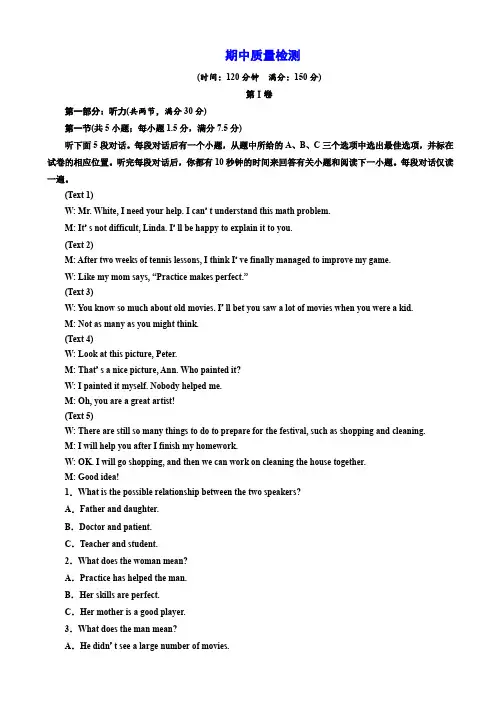
期中质量检测(时间:120分钟满分:150分)第Ⅰ卷第一部分:听力(共两节,满分30分)第一节(共5小题;每小题1.5分,满分7.5分)听下面5段对话。
每段对话后有一个小题,从题中所给的A、B、C三个选项中选出最佳选项,并标在试卷的相应位置。
听完每段对话后,你都有10秒钟的时间来回答有关小题和阅读下一小题。
每段对话仅读一遍。
(Text 1)W: Mr. White, I need your help. I can't understand this math problem.M: It's not difficult, Linda. I'll be happy to explain it to you.(Text 2)M: After two weeks of tennis lessons, I think I've finally managed to improve my game.W: Like my mom says, “Practice makes perfect.”(Text 3)W: You know so much about old movies. I'll bet you saw a lot of movies when you were a kid.M: Not as many as you might think.(Text 4)W: Look at this picture, Peter.M: That's a nice picture, Ann. Who painted it?W: I painted it myself. Nobody helped me.M: Oh, you are a great artist!(Text 5)W: There are still so many things to do to prepare for the festival, such as shopping and cleaning.M: I will help you after I finish my homework.W: OK. I will go shopping, and then we can work on cleaning the house together.M: Good idea!1.What is the possible relationship between the two speakers?A.Father and daughter.B.Doctor and patient.C.Teacher and student.2.What does the woman mean?A.Practice has helped the man.B.Her skills are perfect.C.Her mother is a good player.3.What does the man mean?A.He didn't see a large number of movies.B.He doesn't like old movies.C.He saw more movies than the woman did.4.Who painted the picture?A.Ann.B.Peter.C.Somebody else.5.What will the man do next?A.Do the cleaning.B.Do his homework.C.Do some shopping.第二节(共15小题;每小题1.5分,满分22.5分)听下面5段对话或独白。
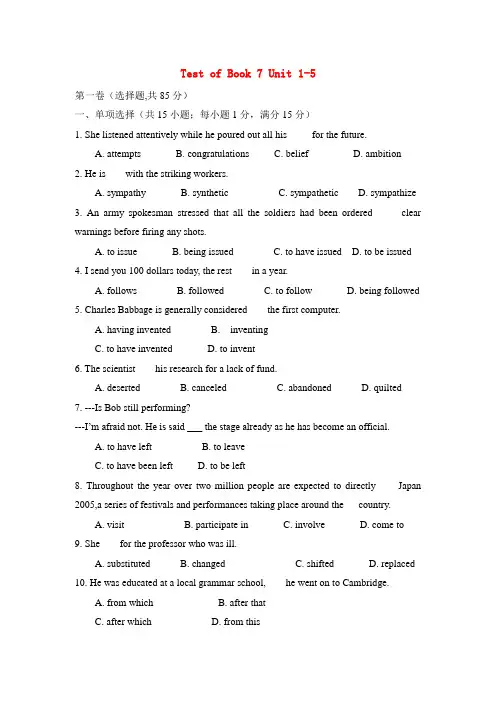
Test of Book 7 Unit 1-5第一卷(选择题,共85分)一、单项选择(共15小题;每小题1分,满分15分)1. She listened attentively while he poured out all his ____ for the future.A. attemptsB. congratulationsC. beliefD. ambition2. He is ___ with the striking workers.A. sympathyB. syntheticC. sympatheticD. sympathize3. An army spokesman stressed that all the soldiers had been ordered ____ clear warnings before firing any shots.A. to issueB. being issuedC. to have issuedD. to be issued4. I send you 100 dollars today, the rest ___ in a year.A. followsB. followedC. to followD. being followed5. Charles Babbage is generally considered ___ the first computer.A. having inventedB. inventingC. to have inventedD. to invent6. The scientist ___ his research for a lack of fund.A. desertedB. canceledC. abandonedD. quilted7. ---Is Bob still performing?---I’m afraid not. He is said ___ the stage alr eady as he has become an official.A. to have leftB. to leaveC. to have been leftD. to be left8. Throughout the year over two million people are expected to directly ___ Japan 2005,a series of festivals and performances taking place around the country.A. visitB. participate inC. involveD. come to9. She ___ for the professor who was ill.A. substitutedB. changedC. shiftedD. replaced10. He was educated at a local grammar school, ___ he went on to Cambridge.A. from whichB. after thatC. after whichD. from this11. Great changes have taken place in that school. It is no longer ___ it was 20 years ago, ___ it was so poorly equipped.A. what, whenB. that, whichC. what, whichD. which, that12. In the office I never seem to have time until after 5:30 p.m.,____ many people have gone home.A. whose timeB. thatC. on whichD. by which time13. His glasses, ________ he was like a blind man, fell to the ground and broke.A. whichB. from whichC. with whichD. without which14. You can’t imagine that a well-behaved gentleman _____ be so rude to a lady.A. mightB. needC. shouldD. would15. ---Do you know where David is? I couldn't find him anywhere.---Well. He ______ have gone far----his coat's still here.A. shouldn’tB. mustn’tC. can’tD. wouldn’t二、完形填空(共20小题;每小题1.5分,满分30分)Not too long ago ,an incident that happened at Walt Disney touched me greatly. A guest 16 out of our Polynesian Village resort(度假胜地)at Walt Disney was asked how she 17 her visit .She told the front-desk clerk she had had a (n) 18 vacation ,but was heartbroken about 19 several rolls of Kodak color film she had not yet 20 .At that moment she was particularly 21 over the loss of the pictures she had shot at our Polynesian Luau , 22 this was a memory she especially treasured.Now ,please understand that we have no written service rules 23 lost photos in the park. 24 ,the clerk at the front desk 25 Disney’s idea of caring for our 26 . She asked the woman to leave her a couple rolls of 27 film ,promising she would take care of the rest of our show at Polynesian Luau.Two weeks later the guest received a 28 at her home .In it were photos of all the actors of our show, 29 signed by each performer. There were also 30 of the public procession(游行队伍)and fireworks in the park ,taken by the front-desk clerk in her own 31 after work. I happened to know this 32 because this guest wrote us aletter .She said that 33 in her life had she received such good service from any business.Excellent 34 does not come from policy (政策性的)handbooks .It comes from people who 35 —and from a culture that encourages and models that attitude. 16.A.working B.checking C.trying D.staying 17.A.expected B.realized C.paid D.enjoyed 18.A.disappointing B.wonderful C.uncomfortable D.important 19.A.taking B.dropping C.losing D.breaking 20.A.developed B.taken C.washed D.loaded 21.A.silly B.nervous C.calm D.sad 22.A.when B.where C.as D.which 23.A.covering B.finding C.making D.keeping 24.A.Excitedly B.Fortunately C.Therefore D.Quietly 25.A.understood B.reminded C.trusted D.discovered 26.A.workers B.guests C.managers D.clerks 27.A.printed B.shot C.unused D.recorded 28.A.film B.card C.camera D.packet 29.A.frequently B.personally C.alone D.actually 30.A.rules B.pictures C.handbooks D.performances 31.A.case B.work C.time D.position 32.A.story B.place C.photo D.show 33.A.only B.almost C.never D.nearly 34.A.advice B.experience C.quality D.service 35.A.care B.serve C.like D.know 三、阅读理解(共20小题;每小题2分,满分40分)AA teacher of English as a second language is the 2004 Teacher of the Year in the United States .Kathy Mellor of Rhode Island will spend the next year as an international spokeswoman for education. President Bush and his wife,Laura ,honored her during a ceremony(仪式)at the White House last week.For the past nineteen years ,Kathy Mellor has taught English as a second language at Davisville Middle School in North Kingstown, Rhode Island ,in the northeastern United States .She redesigned the program for E.S.L students at her school to provide each student with one to three periods per day in classes for English learners .How much instruction the students get depends on their level of skill inlistening ,speaking ,reading and writing. The amount of time they spend in these classes in reduced as their level of English increases.A teacher describes this as the most successful E.S.L. program in North Kingstown. She also praises Kathy Mellor for providing help to students and their families by forming a local parents group for speakers of other languages .This improved their ability to help their children.Kathy Mellor earned a master’s degree in education from Rhode Island College. She studied teaching English as a second language.She was chosen for the national honor of Teacher of the Year from among top teachers in each of the fifty states .As Teacher of the Year ,Kathy Mellor will travel around the United States and to other countries .She will talk about the importance of education and the work of teachers.36.This passage is mainly about________.A.Teacher of the Year 2004 in the United StatesB.Ms Mellor’s English teaching instructionC.Ms Mellor’s teaching skills of learning EnglishD.praises to Ms Mellor from other teachers37.What does “E.S.L.” in the passage stand for?A.English study learners. B.English speaking and listening.C.English special learners. D.English as a second language. 38.From this passage we can learn that ________.A.middle school teachers from each state are honored Teachers of the YearB.middle school teachers in the USA have to get master’s degreesC.Ms Mellor’s students have no problems in learning EnglishD.the American government pays much attention to educationBTired of Working in Your Country"!With over 500 instructors and 20 years of experience, we are the leader in the field of teaching foreign languages. We now have positions open in Osaka starting September/October 2004 for instructors of English, German, Spanish and French.? Teach many different kinds of classes using the latest technology in small classes of up to 3 students.?Accommodation (住宿), and other necessary documents (文件) will be ready before you leave.? Applicants will teach their first language only.? Excellent teacher training programs.If you are young with a university degree and are willing to experience different cultures, apply (申请) now. Experience in teaching is an advantage but not specially required. Knowledge of the Japanese language is not necessary but good English skills and practical computer knowledge are basic requirements.Apply with C. V. and send letters to:NOV A France, Mr. Sampy (IHT3/2)34, Bd. Haussmann, 75009 Paris, FranceFax: 33148014804Or visit our website: www. teadyp. comThe manager expects to meet and talk with successful applicants in Paris in June and July.39. What is the purpose of the text?A. To introduce a language school in Japan.B. To hire language teachers to work in Japan.C. To describe working conditions in Japan.D. To make clear the requirements for Japanese teachers.40. We know from the text that those who are going to Japan will _______.A. teach English only in OsakaB. receive a degree from a universityC. have free accommodationD. get trained for the job41. Before going to Japan, you need _______.A. to see the manager of NOV A FranceB. to take some computer coursesC. to write a letter to JapanD. to find a place to live42. If you want to work in Japan you should _______.A. have some working experienceB. know how to use computersC. present good teaching plansD. speak several languagesCA university graduate described as a “respectable and intelligent” woman is seeking professional help after being convicted of (证明有……罪)shoplifting for the second time in six months.Ana Luz, recently studying for her PhD, has been told she could end up behind bars unless she can control the desire to steal from shops.Luz ,who lives with her partner in Fitzwilliam Road ,Cambridge ,admitted stealing clothes worth £9.95 from John Lewis in Oxford Street ,London ,on March 9.Phillip Lemoyne ,prosecuting(起诉),said Luz selected some clothes from a display and took them to the ladies’ toilet in the store .When she came out again she was wearing one of the skirts she had selected ,having taken off the anti-theft security alarms(防盗警报装置).She was stopped and caught after leaving the store without paying ,Mr Lemoyne said. He added that she was upset on her arrest and apologized for her actions.Luz, 28, was said to have been convicted of shoplifting by Cambridge judges last October, but Morag Duff, defending, said she had never been in trouble with thepolice before that.“She is ashamed and embarrassed but doesn’t really have any explanation why she did this,” Miss Duff said. “She didn’t intend to steal when she went into the store .Sh e is at a loss to explain it. She is otherwise a very respectable and intelligent young lady .She went to her doctor and asked for advice because she wants to know if there is anything in particular that caused her to do this.”Judge David Azan fined Luz £50, and warned : “You’ve got a criminal record .If you carry on like this; you will end up in prison, which will ruin your bright future you may have.”Luz achieved a degree in design at university in her native Spain, went on to a famous university in Berlin, Germany for her master’s degree and is now studying for a PhD at Cambridge University, UK.43.What is Ana Luz’s nationality?A.American. B.British. C.Spanish. D.German.44.What does the underlined sentence “She is at a loss to explain it” m ean?A.In her opinion it was a loss to the clothes shops where she stole things .B.She doesn’t have any idea why she has the desire to steal from shops .C.She thinks it is a loss for her to explain why she stole things from shops.D.Personally she feels ashamed and embarrassed for her shoplifting actions. 45.Which of the following best explains the meaning of the word “shoplifting” used in the passage?A .Carrying goods in a lift for a shop.B.Taking goods to the ladies’ toilet .C.Selecting some goods from a display.D.Taking goods from a shop without paying.46.From the passage we can learn that .A.Ana Luz is already got her PhD at Cambridge University, UKB.Ana Luz is ashamed and embarrassed and knows why she often did soC.the university graduate will be put in prison if she steals in shops once moreD.Phillip Lemoyne is the “respectable and intelligent” woman’s defense lawyer 47.What would be the best title for the passage?A. Shoplifting Shame of a PhD StudentB.Apologizing for the Actions in ShopsC. Seeking Professional Help from ExpertsD.Controlling the Desire to Steal from ShopsDThe gray-haired lady can’t wait to leave the building to search for her dad .Unless watched, she will walk in the streets in an effort to find her father, who died 30years ago.Not all cases of Alzheimer’s disease look like this ,but Alzheimer’s is a serious disease that is said to be the fourth or fifth leading cause of death for people over age 75.It is said that about three percent of the U.S. population over age 65 have Alzheimer’s .In the early stages, people may exhibit short term memory loss. Some may experience changes in personality, easy to be angry .As the disease progresses, patients might lose the ability to move and may be unable to speak or move at all. This progressive disease generally lasts 8 to 10 years before death occurs.While no one is certain what causes these changes in the brain’s nerve fibers (神经纤维),their effect is certain .Alzheim er’s destroys not only the patients ,but also spouses(配偶),friends and families.What should you do if you notice progressive memory loss in yourself or a loved one? Have the person examined by a doctor who is a specialist in the treatment of Alzheimer’s disease.Though many reasons other than Alzheimer’s disease may cause memory loss ,its early diagnosis(诊断)and treatment may delay some of the most serious effects.What feeling will you likely experience should a loved one suffer from Alzheimer’s disease? A person will often go through the various stages of sadness, shock, anger, and so on. If the spouse develops the disease, you may experience hurt and disappointment when he or she doesn’t remember you are married.Life for the Alzheimer’s patients and their loved ones will never be the same as the disease progresses, bringing a deep sorrow, loss and even anger towards God. No matter what feelings are present, facing them honestly will serve one better than burying them.48.What can be inferred from the passage about the gray-haired day?A.She has been living with her father.B.She was sad about the death of her father.C.She can’t search for her father without being watched.D.She suffers from Alzheimer’s disease.49.Wh en people suffer from Alzheimer’s disease, ________.A.their families and friends will suffer from the same diseaseB.their families and friends will experience mental sufferingsC.they will certainly die in 8 to 10 yearsD.they will forget everybody but their spouses50.Memory loss occurs ________.A.from Alzheimer’s disease and nothing elseB.from sadness ,shock ,anger ,and so onC.for a number of reasonsD.with changes in personality51.From the passage we know that_____.A.early treatment may stop Alzheimer’s disease occurringB.it is still unknown what causes the changes in the brain’s nerve fibersC.nerve fibers in the brain will cause Alzheimer’s diseaseD.when one suffers from Alzheimer’s disease ,he will be buriedEWhile in Banff, make time for a walk around town. A special treat is to go up the mountainside on the Banff Gondola for a surprising view of the valley below .Here is The Pines, whose cook has developed a special way of mixing foreign food such as caribou, wild boar, and reindeer with surprising sauces.Best time to visit is during the off-season, from early May to mid-June, or inOctober .This way you can avoid sharing the high way with mobile(移动的)homes which can be pulled by cars .But whatever the season, take some lunch with you from Banff, because there are only a few food stops on the road.Forty minutes north of Banff ,side by side with the Banff National Park ,sits world-famous Lake Louise .This surprisingly small body of water is attractive with towering mountains around it .Glaciers ,huge masses of ice ,moving very slowly against rocks ,produce what is called glacier rock flour ,making its water dark to see .It is worth taking a walk around the grounds of the Chateau Lake Louise ,another beauty ,proud of its early 20th century history.Back on the road , and it’s time to continue north past th e astonishing Columbia Icefield, then turn off the highway and take the short road to the base of the Athabaska Glacier .You can rent ice cleats(夹板)and do some climbing or do a more pleasant snowmobile tour .Either way, you can enjoy endless beautiful sights.Finally you’ll reach Jasper ,the usual turning around the place for the Banff-Jasper loop(回路).It’s worth riding the Jasper Skytram, and be sure to visit the wonderful Jasper Park Lodge ,also dating back to the 1920s.If you can have lunch there ,do it .The restaurant has an adventurous menu and their wine list would put a smile on any visitor’s face.52.According the passage, The Pines is a ________.A.place in which you can see many mobile homesB.mountain where you can get a good view of the valleyC.town which happens to be near the Banff National ParkD.restaurant where you can ask for some special kinds of food53.What will probably happen when visitors come at the end of June?A.They may have trouble finding a restaurant.B.They may come across traffic jams.C.They may travel more easily with cars.D.They may do much more sightseeing.54.Similar to the Chateau Lake Louise, ________.A.the Banff National Park is to the west of BanffB.the Columbia Icefield lies between Lake Louise and the Banff National Park C.the Jasper Skytram has a history of more than 80 yearsD.the Jasper Park Lodge was built in the 1920s55.Besides the beautiful sights in Jasper Park Lodge ,visitors to Jasper can enjoy themselves by ________.A.taking the Jasper Skytram and eating in the restaurantB.taking the Banff-Jasper loop and Jasper SkytramC.having a lot of food to order in the restaurantD.taking the Jasper Skytram back to Banff第二卷(非选择题,共65分)四、用所给短语的正确形式填空。
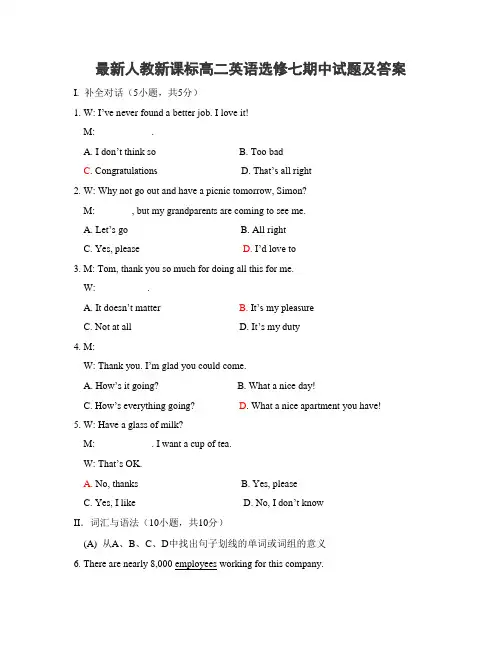
最新人教新课标高二英语选修七期中试题及答案I. 补全对话(5小题,共5分)1. W: I’ve never found a better job. I love it!M: ___________.A. I don’t think soB. Too badC. CongratulationsD. That’s all right2. W: Why not go out and have a picnic tomorrow, Simon?M: _______, but my grandparents are coming to see me.A. Let’s goB. All rightC. Yes, pleaseD.I’d love to3. M: Tom, thank you so much for doing all this for me.W: __________.A. It doesn’t matterB.It’s my pleasureC. Not at allD. It’s my duty4. M: ___________W: Thank you. I’m glad you could come.A. How’s it going?B. What a nice day!C. How’s everything going?D. What a nice apartment you have!5. W: Have a glass of milk?M: ___________. I want a cup of tea.W: That’s OK.A. No, thanksB. Yes, pleaseC. Yes, I likeD. No, I don’t knowII.词汇与语法(10小题,共10分)(A) 从A、B、C、D中找出句子划线的单词或词组的意义6. There are nearly 8,000 employees working for this company.A. 老板B.雇员C. 技术员D. 工程师7. No one laughed at her when she failed.A. 理解B. 在乎C. 嘲笑D. 责备8. I believe that he is very anxious about her.A. 思念B. 痛恨C.担心D. 热爱9. Can you work out this math problem for me?A. 猜测B. 计算C. 修改D. 测试10. She complained that it was too hot.A. 解释B.抱怨C. 感觉D. 深信(B) 从A、B、C、D中选出可以填入空白处的最佳答案。
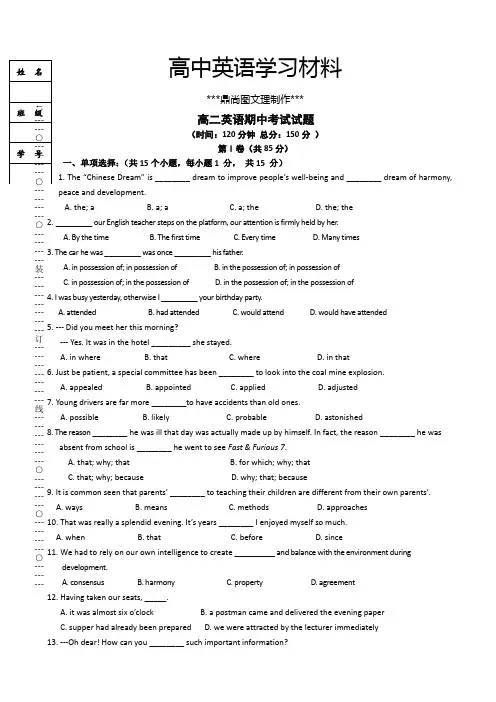
高中英语学习材料 ***鼎尚图文理制作***高二英语期中考试试题 (时间:120分钟 总分:150分 ) 第Ⅰ卷(共85分) 一、单项选择:(共15个小题,每小题1 分, 共15 分) 1. The “Chinese Dream ” is ________ dream to improve people ’s well-being and ________ dream of harmony, peace and development. A. the; a B. a; a C. a; the D. the; the 2. _________ our English teacher steps on the platform, our attention is firmly held by her . A. By the time B. The first time C. Every time D. Many times 3. The car he was _________ was once _________ his father . A. in possession of; in possession of B. in the possession of; in possession of C. in possession of; in the possession of D. in the possession of; in the possession of 4. I was busy yesterday, otherwise I _________ your birthday party. A. attended B. had attended C. would attend D. would have attended 5. --- Did you meet her this morning? --- Yes. It was in the hotel _________ she stayed. A. in where B. that C. where D. in that 6. Just be patient, a special committee has been ________ to look into the coal mine explosion. A. appealed B. appointed C. applied D. adjusted 7. Young drivers are far more ________to have accidents than old ones. A. possible B. likely C. probable D. astonished 8. The reason ________ he was ill that day was actually made up by himself. In fact, the reason ________ he was absent from school is ________ he went to see Fast & Furious 7. A. that; why; that B. for which; why; that C. that; why; because D. why; that; because 9. It is common seen that parents ’ ________ to teaching their children are different from their own parents ’. A. ways B. means C. methods D. approaches 10. That was really a splendid evening. It ’s years ________ I enjoyed myself so much. A. when B. that C. before D. since 11. We had to rely on our own intelligence to create __________ and balance with the environment during development. A. consensus B. harmony C. property D. agreement12. Having taken our seats, _____.A. it was almost six o’clockB. a postman came and delivered the evening paperC. supper had already been preparedD. we were attracted by the lecturer immediately13. ---Oh dear! How can you ________ such important information? 姓 名班 级学 号4.┆┆○┆┆┆┆○┆┆┆┆○┆┆┆┆装┆┆┆┆┆┆┆订┆┆┆┆┆┆┆线┆┆┆┆┆┆○┆┆┆┆○┆┆┆┆○┆┆┆---Forgive me.A. leave outB. carry outC. give outD. hold out14. When I go out at the weekends I use the bike ________ the car if I can.A. in spite ofB. rather thanC. regardless ofD. other than15. --- What would you say to a cup of coffee?--- ___________.A. The thicker, the betterB. Wonderful drinkC. GoodD. No comment二、阅读理解:(共两节,40分)第一节(包括四个阅读理解,共15个小题,每小题2分,共计30分)AOn August 16, 1977, Elvis Presley saved me.The previous afternoon, I played with my six-year-old peers in Heather Peters’ backyard. I was enjoying my cake, when Heather asked me where my sleeping bag was. Only then did I know this party was a sleepover. The word “sleep-over” to a six-year-old bed-wetter is like what “cancer” means to an adult. But what if I told them I was a bed-wetter? At least with cancer, people gather at your bedside instead of running from it.I thought of a way to escape. I would explain that I needed my mother's permission to spend the nights. But as I called my Mom, Heather stood beside me to listen. She granted permission! Then I would be sleeping in the same living room as the other girls. I didn't bring my own pajamas(睡衣),so Mrs. Peters offered me Heather's pajamas.As the other girls drifted into their sweet dreams, I tried to stay awake. “Do I nee d to go again? I'll stay up to go one more time.. .”.Of course , I finally fell asleep.The next morning , I was the first to wake up. I was warm! I lay in panic for what seemed like hours before the other girls started to wake up. I did the only thing I could do — I pretended that the bed-wetting didn't happen. I got up, took off Heather's pajamas and changed into my clothes like the other girls.Mrs. Peters walked into the room, and before she could say anything, she stepped right onto the pile of my wet pajamas. My heart stopped as I watched her face burn red. “WHO DID THIS?” She screamed, with a look so frightening. Should I answer? And that was when it happened — Mr. Peters came in and grabbed his wife , ‘‘Elvis Presley died!”The news of the King's death overtook Mrs. Peters, and I ,was spared. I got home without the other girls knowing what had happened.16. The author had to spend the night at Peters' because ________.A. she enjoyed her cake thereB. the famous singer Elvis Presley died that nightC. her mother allowed her to do soD. It was a routine of the party17. Mrs. Peters got angry because ________.A. she found the wet pajamasB. Elvis Presley passed awayC. her husband was rude to herD. all the girls slept at her house18. From the story, we know Mrs. Peters was ________.A. a bad-tempered womanB. a fan of Elvis PresleyC. a woman for perfectionD. a woman who hated to wash pajamas19. The passage is mainly about ________.A. an embarrassing childhood incidentB. a fan-purchasing experienceC. the shocking death of a famous singerD. an unfriendly hostessBLearning to communicate in another language may be challenging, but it is also a very rewarding and enriching experience. It is the best passport to discovering another culture. Here are a few tips to help you makethe most of the experience.Work at your own pace.Make the most of the time you have available to study. You will find you can learn more effectively if you study for half an hour every day, rather than try to do a whole unit in one sitting.Why not learn with someone else?It helps if you can learn with someone else. If you can persuade a friend or family member to study with you, it will give you extra motivation to keep working.Remember that you can go a long way with just a little language.Even if you feel unsure about your ability to form right sentences, you’ll find that it is possible to communicate with just a few words. Above all, don’t worry about getting things wrong: people will still be able to understand you. The more confidence you gain in communicating, the more fluent you’ll become.Build up your vocabulary.A wide vocabulary is the key to successful language learning but don’t try to learn too much at once. It’s best to study frequently. Put words into sentences to fix them in mind, and come back to them later. Learning vocabulary in this way is usually very effective.And most of all, have fun!20. This passage is basically about some ______ of foreign language learning.A. newsB. noticesC. suggestionsD. advertisements21. In the writer’s opini on, it is better to study ______.A. for half an hour every dayB. a whole unit at a timeC. more than an hour a dayD. at any time in the day22. Learning to speak a foreign language is the key to enjoying another ______.A. challengeB. cultureC. experienceD. discoveryCTwo of the hardest things to accomplish in this world are to acquire wealth by honest effort and, having gained it, to learn how to use it properly. Recently I walked into the locker room of a rather well known golf club after finishing a round. It was in the late afternoon and most of the members had left for their homes. But a half-dozen or so men past middle age were still seated at tables talking aimlessly and drinking more than was good for them. These same men can be found there day after day, and, strangely enough, each one of these men had been a man of affairs and wealth, successful in business and respected in the community If material prosperity were the chief necessity for happiness, then each one should have been happy. Yet, it seemed to me, something very important was missing, else—there would not have been the constant effort to escape the realities of life through scotch and soda. They knew, each one of them, that their productivity had ceased(停止). When a fruit tree ceases to bear its fruit, it is dying. And it is even so with man.What is the answer to a long and happy existence in this world of ours? I think I found it long ago in a passage from the book of Genesis which caught my eye while I was looking through my Bible. The words were few, but they became memorably impressed on my mind. "In the sweat of the face shall you eat the bread. "To me, that has been a challenge from my earliest recollections (memories). In fact, the battle of life, of existence, is a challenge to everyone. The immortal words of St. Paul, too, have been and always will be a great inspiration to me. At the end of the road I want to be able to feel that I have fought a good fight, I have finished the course, I have kept the faith.23. Which of the following is indicated in the first paragraph?A. Wealth results from honest effort.B. The men seated at tables in the locker room are lost in the significance of life.C. The men acquire wealth by planting fruit trees.D. For some people, no way can be found to escape the realities of life other than scotch and soda.24. The underlined sentence "In the sweat of the face shall you eat the bread "means________.A. Bread tastes delicious when sweat pours off your faceB. No pains, no gainsC. Failure is the mother of successD. Bread comes from the sweat on your face25. We learn from the passage that the author_______.A. was a wealthy person in the communityB. held a positive attitude towards an active lifeC. was fond of associating with celebrities (名人)D. kept a secret of the reason why he was so impressed26. What is implied in the passage by the writer?A. To use wealth properly, eat, drink and be merry.B. Where there is a will, there is a way.C. If you cease to struggle, you cease to live.D. As life is but like a dream, a man is like a fruit tree.DWe know that hugs make us feel easy inside. And this feeling, it turns out, could actually ward off stress and protect the immune (免疫) system, according to a new research from Carnegie Mellon University.It’s a well-known fact that stress can weaken the immune system. In this study, the researchers sought to determine whether hugs—like social support more broadly—could protect individuals from the increased sensitivity to illness brought on by the particular stress that come with interpersonal conflict.“We know that people experiencing ongoing conflicts with others are less able to fight off cold viruse s. We also know that people who report having social support are partly protected from the effects of stress on psychological states, such as depression and anxiety,”the study’s lead author, psychologist Dr. Sheldon Cohen, said in a statement. “We tested whether awareness of social support is equally effective in protecting us from sensitivity to infection caused by stress and also whether receiving hugs might partially account for those feeling of support and thus protect a person against infection.”In the experiment , over 400 healthy adults filled out a questionnaire about their perceived (感知) social support and also participated in a nightly phone interview for two weeks. They were asked the frequency they engaged in interpersonal conflicts and received hugs that day.Then, the researchers exposed the participants to a common cold virus, and monitored them to assess signs of infection. They found that both perceived social support and more frequent hugs reduced the risk of infection associated with experiencing interpersonal conflict. Regardless of whether or not they experienced social conflicts, infected participants with greater perceived social support and more frequent hugs had less severe illness symptoms.“This suggests that being hugged by a trus ted person may act as an effective means of conveying support and that increasing the frequency of hugs might be an effective means of reducing the effects of stress,” Cohen said. “The apparent protective effect of hugs may result from the physical contact itself or hugging being a behavioral indicator of support and closeness. Either way, those who receive more hugs are somewhat more protected from infection.”If you need any more reason to go wrap your arms around someone special, consider this: hugs also lower blood pressure, reduce fearsome around death and dying, improve heart health and decrease feeling of loneliness.27. In Paragraph 1, the underlined words “wa r d off “can be replaced by ____.A. produceB. increaseC. supportD. prevent28. Dr. Sheldon Cohen’s experiment shows that ____.A. hugs can hide serious illness symptomsB. social conflicts can monitor signs of infectionC. depression and anxiety result from less social supportD. social support can reduce the risk of having a cold29. The passage aims to convey that ____.A. hugs can have protective effectsB. social support can cure diseasesC. stress can weaken our immune systemD. interpersonal conflicts cause infections30. The passage is most likely to be found in ____.A. a social science magazineB. a commercial brochureC. an academic essayD. a medical report第二节(共5小题;每小题2分,满分10分)根据短文内容,从短文后的选项中选出能填入空白处的最佳选项。
高中英语学习材料***鼎尚图文理制作***考试时间:2012年11月13日第一部分听力(共两节,满分30分)先将答案标在试卷上。
录音内容结束后,你将有两分钟的时间将试卷上的答案转涂到答题卡。
第一节(共5小题,每小题1.5分,满分7.5分)听下面5段对话。
每段对话后有一个小题,从题中所给的A、B、C三个选项中选出最佳选项,并标在试卷的相应位置。
听完每段对话后,你都有10秒钟的时间来回答有关小题和阅读下一小题。
每段对话仅读一遍。
1. Where does this conversation most probably take place?A. In an officeB. In a shopC. In a restaurant2. What can we conclude about the woman?A. She doesn’t want to be a teacherB. She is sure to be a teacherC. She wants to ask the man for advice3. What’s the man’s job?A. A painterB. An artistC. A businessman4. Where did the conversation most probably take place?A. At a theaterB. At a restaurantC. At an airport5. What day is today?A. FridayB. SaturdayC. Sunday第二节(共15小题;每小题1.5分,满分22.5分)听下面5段对话或独白。
每段对话或独白后有几个小题,从题中所给的A、B、C三个选项中选出最佳选项,并标在试卷的相应位置。
听完每段对话或独白前后,你将有时间阅读各个小题,每小题5秒钟;听完后,各小题将给出5秒钟的作答时间。
2021年中考试高二英语试题(选修七)第一部分:听力(共两节,满分30分)第一节(共5小题;每小题1.5分,满分7.5分)1. How many people survived the air crash?A. Less than 40.B. About 120.C. More than 80.2. What’s the woman’s suggestion?A. Go to the post office.B. Buy a stamp.C. Visit his aunt.3. What size does the woman need?A. Small size.B. Medium size.C. Big size.4. What is wrong with the woman?A. She has a fever.B. Her leg was broken.C. Something is wrong with her ears.5. Why doesn’t the man dance?A. The music is too fast.B. The music is too slow.C. He is not able to dance.第二节 (共15小题; 每小题 1.5 分, 满分 22.5 分)听第6段材料,回答第6至7题6. What does the man need?A. A Chinese driver’s license.B. An American driver’s license.C. An international driver’s license.7. How can the man get the license he needs?A. He can buy one.B. Only by studying in a school.C. By passing two tests.听第7段材料,回答第8至9题。
第一学期高二期中考试英语试卷(命题范围:必修5)本试卷分第Ⅰ卷(选择题)和第Ⅱ卷(非选择题)两部分。
第Ⅰ卷1 至12页,第Ⅱ卷13至14页。
满分150分。
考试时间120分钟。
第Ⅰ卷(共105分)第一部分听力理解(共两节,满分20分)第一节(共5小题;每小题1分,满分5分)听下面5段对话。
每段对话后有一个小题,从题中所给的A、B、C三个选项中选出最佳选项,并标在试卷的相应位置。
听完每段对话后,你都有10秒钟的时间来回答有关小题和阅读下一小题。
每段对话仅读一遍。
1. What will the woman probably do?A. Return the novel to Alice immediately.B. Ask Alice if the man can borrow the novel.C. Help the man find his own copy of the novel.2. What will the woman do?A. Wait until the rain stops.B. Wait for her own raincoat.C. Borrow the man’s raincoat.3. What’s the probable relationship between the speakers?A. Mother and son.B. Doctor and patient.C. Boss and employee.4. When will the speakers get to the school if they leave now?A. At 8:00.B. At 8:10.C. At 8:15.5. What does the man mean?A. It is easy to pass the exam given by Mr. Smith.B. Mr. Smith often makes mistakes.C. Mr. Smith’s course is difficult.第二节(共l5小题;每小题1分,满分15分)听下面5段对话。
每段对话后有几个小题,从题中所给的A、B、C三个选项中选出最佳选项,并标在试卷的相应位置。
听每段对话前,你将有时间阅读各个小题,每小题5秒钟;听完后,各小题给出5秒钟的作答时间。
每段对话读两遍。
听第6段材料,回答第6至7题。
6. What does the woman say about her passport?A. She has packed it in one of her bags.B. She is going to get it at the airport.C. She is afraid that she has lost it.7. Why does the man ask the woman to hurry?A. The plane is taking off soon.B. There are many things to pack.C. The taxi is waiting for them.听第7段材料,回答第8至10题。
8. Who is answering the phone?A. Judy’s brother.B. Susan’s cousin.C. Judy’s cousin.9. What happened to Susan’s bat?A. It was stolen.B. It was broken.C. It was lost.10. What does Susan ask Judy to do tomorrow?A. Bring the book and the extra bat.B. Call Susan and her cousin back.C. Play table tennis with her brother.听第8段材料,回答第11至13题。
11. What can we know about the woman from the conversation?A. She ate something bad last night.B. She ate too much before sleeping last night.C. She has caught a bad cold.12. What does the woman probably do?A. A teacher.B. A doctor.C. A student.13. Why does the woman ask the man to fill out the form?A. She is feeling too bad to write anything.B. She doesn’t understand the language printed in the form.C. She doesn’t know how to fill in the form.听第9段材料,回答第14至16题。
14. What is the woman going to do this afternoon?A. Go out for her holiday.B. Look for a part-time job.C. Give some children lessons.15. How did the woman find her part-time job?A. She saw a notice and contacted the person who had put up the notice.B. She put up a notice on a light pole and someone called her up.C. The man helped her to find the job.16. What is the man good at?A. Teaching English.B. Spoken English.C. Written English.听第10段材料,回答第17至20题。
17. Where is the pie-eating contest usually held?A. In a fast-food restaurant.B. At a shopping center.C. At a county fair.18. What should a person do before entering the pie-eating contest?A. Avoid eating any food.B. Practice eating a pie quickly.C. Wash his hands thoroughly.19. Where is one advised to put his hands during the contest?A. On his lap.B. Under his bottom.C. Behind his back.20. What suggestion is offered for eating up the pie quickly?A. Looking sideways to see how fast your neighbor eats.B. Eating from the outside toward the middle.C. Holding the pie in the right position.第二部分英语知识运用(共两节,满分45分)第一节单项填空(共15小题;每小题l分,满分l5分)从A、B、C、D四个选项中,选出可以填入空白处的最佳选项,并在答题卡上将该项涂黑。
21. --- You couldn’t have bought a better gift for my birthday, Lilly.--- _______.A. I’m sorry you don’t like itB. I am glad you like it so muchC. I can’t agree with youD. I guess you must be joking22. The opening between the rocks was very narrow, but the soldiers managed to _______ through.A. pressB. spreadC. squeezeD. jump23. Ted doesn’t know what to ______ at the university; he can’t make up his mind about his future.A. take onB. take awayC. take offD. take up24. We will have to finish the job, ______.A. however long takes itB. however long does it takeC. however it takes longD. however long it takes25. A special international educational team, ______ four Germans and two Americans, will soon visit our city.A. consisted ofB. consisting ofC. made upD. making up26. It really makes ______ difference to them who will take charge of Libya in ______ place of Gaddafi.A. a; /B. a; theC. the; theD. the; /27. The clean towels are in the drawer---if you need ______.A. thatB. itC. oneD. so28. ---Does Ann obey her parents?---Yes, she will never do anything that is not approved ______ by her parents.A. withB. ofC. toD. at29. The government has taken ______ steps to strengthen safety in schools. Parents are quite satisfied with them.A. cautiousB. severeC. negativeD. positive30. John opened the door. There ______ he had never seen before.A. a girl did standB. stood a girlC. did a girl standD. a girl stood31. The best reporters have been sent there to ______ the war, so we can get informed of the situation there very quickly.A. supportB. rescueC. coverD. prevent32. Mrs. White is due to arrive on Thursday. ______, what do we do?A. AnywayB. MeanwhileC. ThereforeD. Particularly33. Knowing Mike has entered for the examination I passed last year, I strongly demand ______ the book.A. readingB. him to readC. to readD. he read34. ______ of stealing his student’s ideas and publishing them, the professor has been fired by the university.A. AccusedB. AccusingC. To accuseD. Having accused35. ---You can have a pet dog, but suppose you get bored with it in a few days, ______?---We won’t, we promise!A. So whatB. Then whatC. For whatD. How come第二节完形填空(共20小题;每小题l.5分,满分30分)阅读下面短文,从短文后各题所给的四个选项(A、B、C和D)中,选出可以填入空白处的最佳选项,并在答题卡上将该项涂黑。